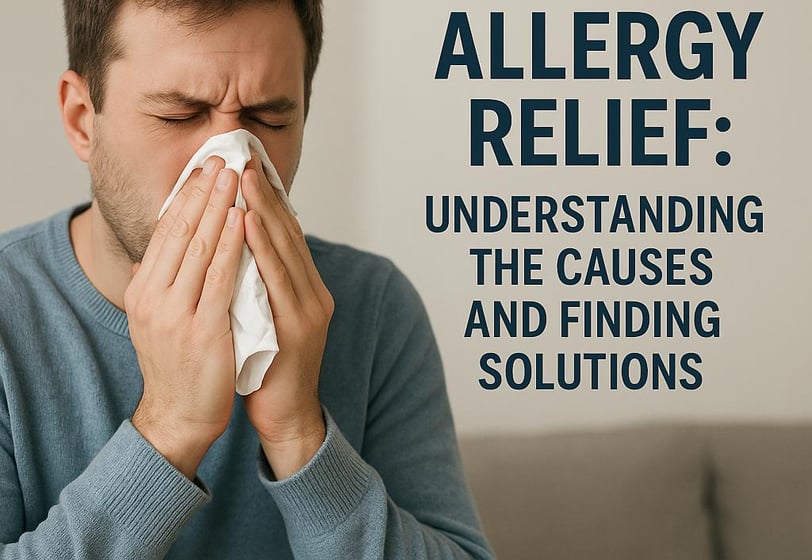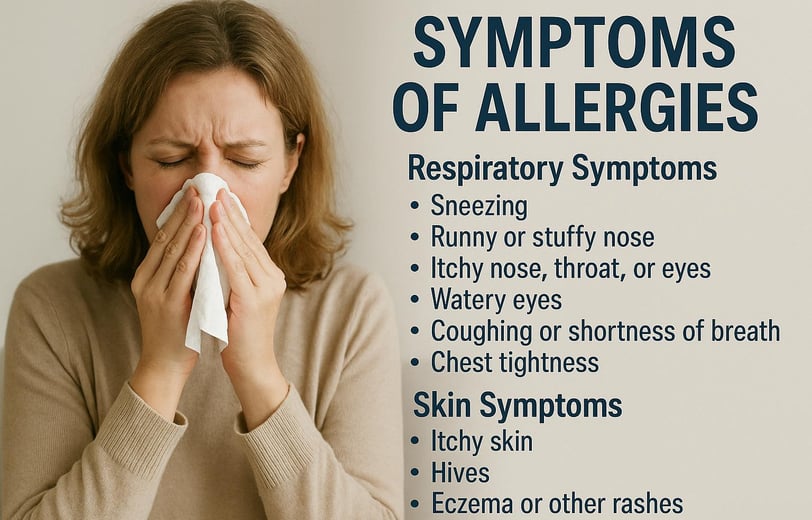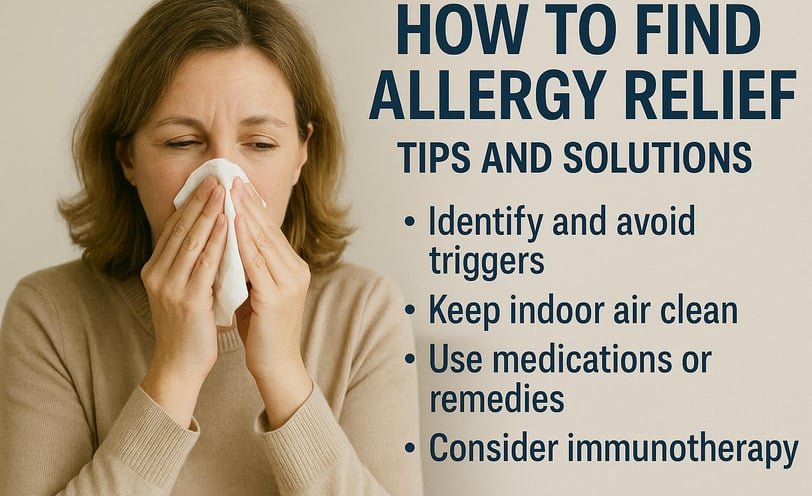Effective Allergy Relief: Simple Tips to Breathe Easier and Feel Better
Allergies can make life uncomfortable, but with the right strategies, you can find relief. From avoiding triggers to using natural remedies and medications, this post will guide you through the best ways to manage allergy symptoms and breathe easier. Whether you're dealing with seasonal allergies or persistent pet dander, you'll discover practical tips to help reduce symptoms and improve your quality of life. Don’t let allergies hold you back—start finding relief today!
WELLNESS
James B.
5/28/20256 min read
Allergy Relief: Effective Solutions
Allergy Relief: Understanding the Causes and Finding Solutions
Allergies are common, and for many people, they are an ongoing struggle. Whether it’s seasonal pollen, food allergies, or pet dander, the symptoms can vary from mild to severe. The good news is, there are many ways to manage and even relieve allergy symptoms. This article will help you understand allergies better, the most common causes, and how to effectively find allergy relief.
What Are Allergies?
An allergy occurs when your immune system overreacts to a substance that’s normally harmless to most people. These substances are known as allergens. When an allergic person comes into contact with an allergen, their body mistakenly identifies it as a threat and launches an immune response, which can lead to symptoms like sneezing, itching, rashes, and even more severe reactions such as anaphylaxis.
Allergies can affect anyone, regardless of age or gender. They may develop at any point in life, and some individuals may even outgrow their allergies over time.
Common Types of Allergies
Seasonal Allergies (Hay Fever)
These are among the most common allergies, affecting millions of people, especially during certain seasons. The primary allergens here are pollen from trees, grasses, and weeds. When the wind carries pollen, people with sensitivities may start sneezing, itching, and have watery eyes. This condition is often referred to as hay fever.Food Allergies
Food allergies can cause a wide range of symptoms, from mild itching to life-threatening anaphylaxis. The most common food allergens include peanuts, tree nuts, dairy, eggs, fish, and shellfish. Even small amounts of these foods can trigger an allergic reaction.Pet Allergies
Pets, particularly cats and dogs, can produce allergens that may cause symptoms like sneezing, itchy eyes, and asthma. The allergens are typically found in the skin cells (dander), urine, and saliva of the animals.Dust Mite Allergies
Dust mites are microscopic creatures that live in dust. They are found in bedding, carpets, and furniture. The tiny particles they produce can trigger allergic reactions in sensitive individuals.Mold Allergies
Mold thrives in damp, humid environments and can produce spores that float in the air. When inhaled, these spores can cause symptoms like sneezing, runny nose, and even asthma in susceptible individuals.Insect Sting Allergies
Some individuals have allergic reactions to the venom of insects like bees, wasps, and ants. Symptoms can range from mild swelling at the sting site to severe reactions, including anaphylaxis.Drug Allergies
Certain medications can cause allergic reactions. Penicillin is one of the most common examples, but people can be allergic to a wide range of drugs, including non-prescription ones.
Symptoms of Allergies
The symptoms of an allergic reaction can vary depending on the type of allergen and the individual’s sensitivity. Some common symptoms include:
Sneezing and Coughing: Often caused by pollen, dust, or pet dander.
Itchy or Watery Eyes: This is typical in response to pollen, dust, or pet dander.
Runny or Stuffy Nose: Often a result of seasonal allergies or dust mites.
Hives or Skin Rash: Common with food allergies or insect bites.
Shortness of Breath or Wheezing: Common in people with asthma, often triggered by pollen, dust, or pet dander.
Swelling: Especially around the face, lips, or throat, and can be dangerous if it affects breathing (a sign of a serious reaction).
How to Find Allergy Relief: Tips and Solutions
There are several approaches to finding relief from allergies, ranging from lifestyle changes to medications and natural remedies. Let’s explore some of the most effective allergy relief options:
1. Avoidance of Allergens
The most effective way to prevent an allergic reaction is to avoid allergens. Here are some strategies for reducing exposure:
For Pollen: Stay indoors during peak pollen hours (usually early morning and late evening). Keep windows and doors closed, use air conditioning, and wash your clothes after being outdoors.
For Pet Dander: If possible, keep pets out of certain areas of your home, particularly the bedroom. Bathe your pets regularly and clean their bedding often.
For Dust Mites: Use dust-proof covers on pillows and mattresses. Wash bedding frequently in hot water and avoid carpets, which trap dust.
For Mold: Keep areas of your home dry, especially basements, bathrooms, and kitchens. Use a dehumidifier to maintain proper humidity levels in your home.
2. Medications for Allergy Relief
Medications are one of the most common ways to relieve allergy symptoms. They work by reducing inflammation and blocking the effects of allergens in your body. The main types of medications used for allergy relief include:
Antihistamines: These medications block histamine, the chemical that your body releases during an allergic reaction. Antihistamines can help alleviate symptoms like sneezing, itching, and runny nose. Common options include diphenhydramine (Benadryl), loratadine (Claritin), and cetirizine (Zyrtec).
Decongestants: These medications help relieve nasal congestion by narrowing the blood vessels in your nose. They can be taken orally or used as nasal sprays. Examples include pseudoephedrine (Sudafed) and oxymetazoline (Afrin).
Nasal Sprays: Corticosteroid nasal sprays (such as fluticasone, Flonase) reduce inflammation in the nasal passages and provide longer-lasting relief from congestion, sneezing, and runny nose.
Eye Drops: For itchy, watery eyes, antihistamine eye drops (such as Ketotifen) can be effective in providing relief.
Allergy Shots (Immunotherapy): For individuals with severe allergies that do not respond to other treatments, allergy shots can help. These involve receiving small amounts of allergens over time to help desensitize the immune system.
3. Natural Remedies for Allergy Relief
Many people prefer natural remedies to avoid the side effects of medications. Here are a few natural options that may provide relief from allergies:
Local Honey: Some believe that consuming local honey can help your body build tolerance to local pollen. The theory is that honey contains trace amounts of pollen, which may help your immune system adjust to allergens.
Neti Pot: This is a saline solution used to rinse out the nasal passages, helping to clear out allergens and mucus. Using a neti pot can provide immediate relief from nasal congestion.
Herbal Teas: Some herbal teas, like chamomile and peppermint, are known to have anti-inflammatory properties that may help with allergy symptoms.
Essential Oils: Essential oils like eucalyptus, lavender, and peppermint can be diffused in the air or applied topically to help ease symptoms of congestion, coughing, and sneezing.
4. Lifestyle Changes for Allergy Relief
Your lifestyle plays a significant role in managing allergies. Here are some changes you can implement to reduce symptoms:
Exercise Regularly: Regular physical activity can boost your immune system and help keep allergy symptoms under control.
Monitor Pollen Counts: Many weather apps and websites offer daily pollen count reports. On days with high pollen levels, it’s a good idea to stay indoors as much as possible.
Keep Your Home Clean: Regular cleaning can help reduce allergens in your home. Use a vacuum cleaner with a HEPA filter and wipe down surfaces with a damp cloth to trap dust.
Wear Sunglasses: Sunglasses can help protect your eyes from pollen when you’re outside. They also keep your eyes from becoming dry and irritated.
5. Seeking Professional Help
If your allergies are severe or persist despite over-the-counter treatments, it may be time to see an allergist. An allergist can perform tests to identify specific allergens and recommend treatments like allergy shots or stronger medications. It’s important to consult with a healthcare professional before making any changes to your treatment plan.
Conclusion: Managing Allergies Effectively
Allergies can be a nuisance, but they don’t have to take over your life. By understanding what triggers your symptoms and using the appropriate treatments, you can find relief. From avoiding allergens to using medications, natural remedies, and making lifestyle changes, there are plenty of options available for managing allergies.
Remember, what works for one person may not work for another, so it may take some trial and error to find the best allergy relief plan for you. Don’t hesitate to consult with a doctor if you’re unsure about which treatment is right for you. With the right approach, you can breathe easy and live comfortably despite your allergies.









